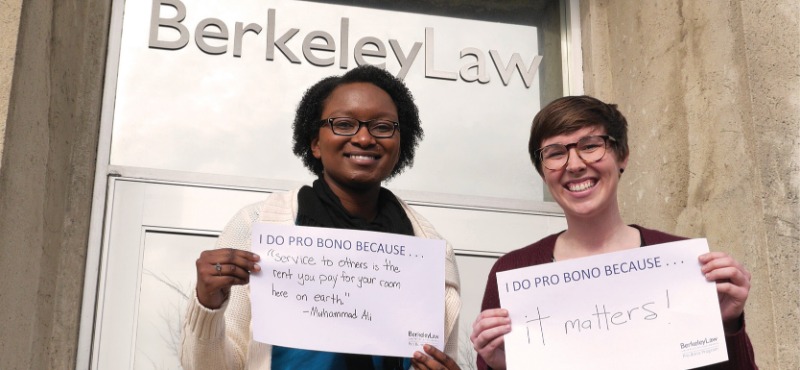Dean Erwin Chemerinsky of Berkeley Law is a forceful advocate of the Pro Bono Program at UC Berkeley’s Law School. Chemerinsky is pushing to create the nation’s preeminent Pro Bono Program at Berkeley Law. As clinical professor and faculty co-director of the Pro Bono Program David Oppenheimer puts it, “Some schools have a pro bono requirement; at Berkeley Law, we have a pro bono culture.”
Berkeley Law’s Pro Bono Program also has strong support and assistance from one of the leading personal injury firms in the Bay Area: Gillin, Jacobson, Ellis, Larsen and Lucey. “All of our partners began their careers in public service, and we’ve never forgotten our roots,” says Andrew Gillin, managing partner. GJELL’s continued support of Berkeley Law’s Pro Bono Program has provided critical assistance to allow the program to grow and develop.
And for partner Luke Ellis, a Berkeley Law graduate, there’s no better place than Berkeley Law to give back to the community. “We’re incredibly proud to engage with the law school, helping its students serve the public good. Berkeley Law is doing extraordinary work in this area.”
Indeed, Berkeley Law’s Pro Bono Program is extremely rich and diverse, involving more than 500 law students a year. Nearly all of the incoming law students participate in the Pro Bono Program, beginning their first month in law school. Deborah Schlosberg, the director of the Pro Bono Program at Berkeley Law, notes that there are 32 separate pro bono projects this year designed and organized by second- and third-year law students responding to community needs on a wide range of subjects.
The second- and third-year law students actually lead the projects with the assistance of faculty and outside attorneys. Each year the project list grows as the students identify needs in the community that they wish to engage and respond to. The culture and ownership of the projects are then passed on to the first-year students who in turn carry on the pro bono tradition at Berkeley Law.
The pro bono projects, called SLPS (Student-Initiated Legal Services) projects, touch on almost every area of outstanding need, from the homelessness service project and the Berkeley Immigration Group – Detention Project to the workers’ rights clinic and the youth advocacy project. As Ms. Schlosberg points out, “The Pro Bono Program at Berkeley Law allows our students to not only engage their minds in the classroom, but to roll up their sleeves and get to work on behalf of clients as early as their first month of law school.” Other notable SLPS projects include the anti-trafficking project, the California asylum representation project, and the consumer rights workshop.
Berkeley Law’s Pro Bono Program is making an indelible impact on both the community served as well as the law students. Benjamin Phillips, Class of 2020, says, “I learned more doing pro bono at Berkeley Law than from anything else in law school. That’s not to demean the classroom instruction, but to emphasize the importance of the Pro Bono Program. There’s no substitute for doing real work for real people. And serving others confirmed that a public interest path is right for me.”
Kelsey Peden, also Class of 2020, notes, “The SLPS program grounded me in my first year of law school. Classroom learning is important, but being able to take what I learned and apply it to social justice causes was a constant reminder of the importance of what we study. It motivated me, inspired me to work harder, and reminded me of why I applied to law school in the first place.”
The newest component of the Pro Bono Program is a burgeoning trend of service trips taken outside the Bay Area, typically over the student break periods. Known as Berkeley Law Alternative Service Trips, or the “BLAST” program, students are provided with short but intensive pro bono legal service trips to regions outside the immediate Bay Area. In August 2018, one such venture to south Texas was designed to aid immigrants detained at the border. Brenda Munoz, Class of 2019, was on that trip. “Our work in south Texas helping detained migrants get released on bond and apply for asylum has been one of the most rewarding experiences during our time at Berkeley.”
Over its 40-plus-year history, GJELL has focused its practice on achieving record-setting results for individual clients harmed by the injustice of others. But the partners have also never lost sight of the need to help train the next generation of great lawyers who apply the spirit of public interest law in whatever area of the law they choose to practice.
Helping Berkeley Law create the finest pro bono program in the country brings GJELL full circle. As a law student, Berkeley Law provided Mr. Ellis an invaluable opportunity to work in the public defender’s office helping indigent youths navigate the juvenile court system. And as young lawyers starting their careers, Mr. Gillin and Mr. Jacobson worked for the Neighborhood Legal Center in East Palo Alto. Their supervisor was the Honorable Thelton Henderson of the U.S. District Court (Ret.), a social justice icon who is now a visiting professor at Berkeley Law and a strong proponent of Berkeley Law’s blossoming Pro Bono Program.




















